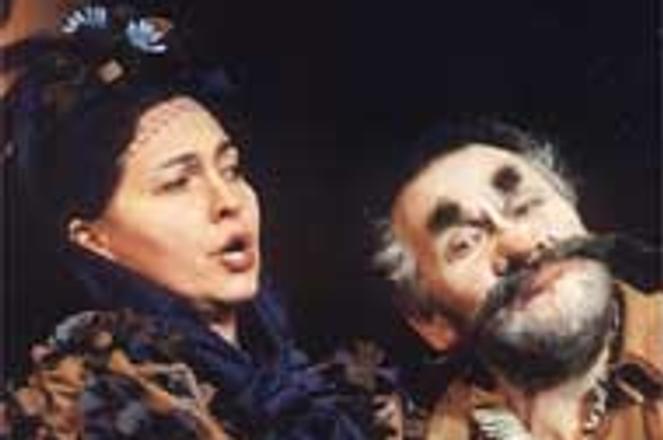SND's presentation of Verdi's Falstaff makes up in music for what it lacks in casting.photo: Courtesy Slovenské Národné Divadlo
Falstaff
By: Giuseppe Verdi
Where: Slovenské Narodné Divadlo (Slovak National Theatre)
Tickets: 50 to 200 Sk
Next performances: April 14 and May 24 at 19:00
English Program: No
Falstaff, the comic opera by Italian composer Giuseppe Verdi based on William Shakespeare's The Merry Wives of Windsor, continued its showing at the Slovak National Theatre March 29. While not flawless, the opera's fabulous music gets enough support from the actors and visual designers to make it yet another solid bet in the National Theatre's ongoing opera season.
The opera begins with Sir John Falstaff (played by Richard Haan), a debauched knight with a paunch to match his oversized vanity, terrorizing the few patrons of a small pub. Falstaff believes wholeheartedly in the greatness of his character and his stomach, and decides to deomonstrate his own irresistibility by seducing two married women and plundering their husbands.
To further these wicked ends Falstaff sends a single flirtatious letter to Alice Ford (Eva Šeniglová) and her friend Meg Page (Denisa Šlepkovská). His plan backfires however, when they receive the letters at the same time and decide to unleash Mrs. Ford's jealous husband (Ján Durčo) on Falstaff.
Verdi's last work, Falstaff is said to be his greatest and most innovative. The music, dense with motifs and counterpoint, follows closely the myriad personalities entwined into the opera's plot. Highlights of the score include several four-part staccato harmonies as Alice Ford and her circle of friends plot Falstaff's undoing, and later as her cuckolded husband raves with jealousy while his cohorts jabber by his side. Themes explored in these moments and elsewhere come togther later in a swelling finale that is full of enough tension and passion for several whole operas.
The problem is that at times the performers don't live up to the spirit of the music. Durčo comes across as a bit boyish for an angry husband, and Haan as Falstaff is neither arrogant, fat nor funny enough; in the opera's penultimate scene, where the townspeople have come in masks to torment and mock Falstaff, the audience gets little insight into his fear and humiliation. The four female leads (including Adriana Kohítková as Nanetta, Alice's daughter, and Jitka Sapara-Fischerová as Quickly, her female servant) perform better as they craftily and intelligently keep the action moving, making fools of the men by exploiting their emotional excesses.
Falstaff is supposed to be about the tragedy of human vanity and ridicule seen through laughter instead of tears. For those unfamiliar with the story, this theme might not be readily apparent because of the mediocre acting - however, since opera is more a matter of music, the audience will be pleased regardless.
For those interested in seeing more Verdi operas, the Slovak National Theatre's opera season includes several of the romantic composer's other works, including Nabucco, Aida, Don Carlos and La Traviata.

